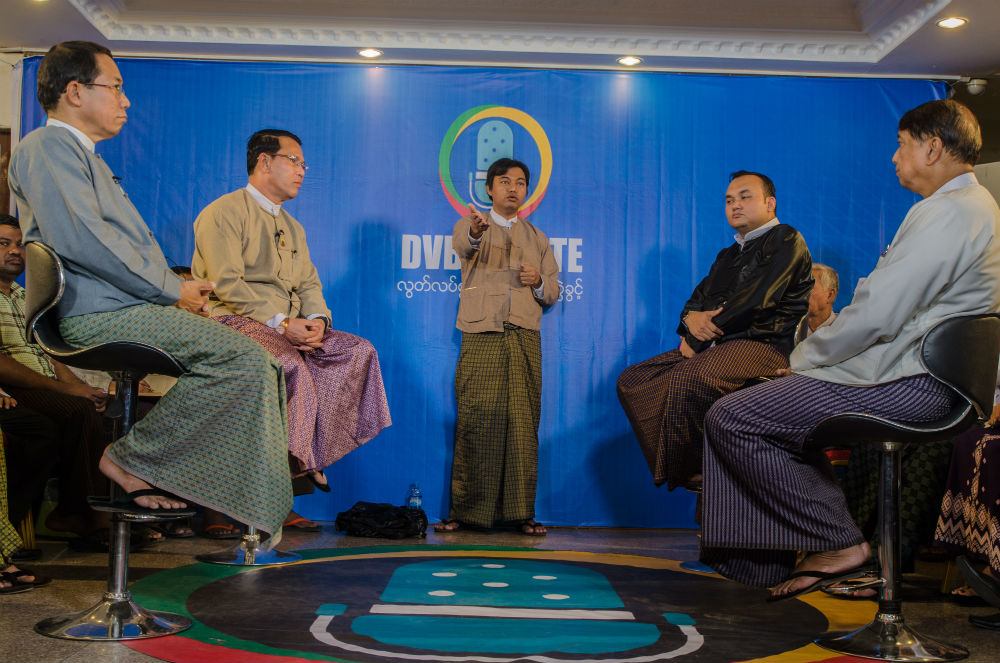Debate participants, including Rakhine State Chief Minister Maung Maung Ohn (upper left), discuss boat people crisis in Yangon on May 31, 2015. PHOTO/AUNG NAING SOE
The Democratic Voice of Burma’s televised debate on solutions to the migrant crisis in Yangon on Sunday started out with ground rules for audience members and participants:
No use of “terminology,” the main moderator advised. When talking about migrants and refugees, use the words “boat people.”
Translation: don’t say Rohingya to describe the Muslims fleeing western Myanmar’s Rakhine State. Or, for that matter, don’t say Bengali either, the government’s preferred term for the group.
While the rules were intended to create a sense of neutrality so the debate wouldn’t founder on contentious terminology alone, they weren’t enough to ensure a smooth event. Inside the hot, packed room on the first floor of the Orchid Hotel, riled-up audience members shouted out anti-migrant jibes and interrupted the discussion between the four participants, including Maung Maung Ohn, the chief minister of Rakhine State.
Migrants have beards so they can’t be Burmese, someone said, while another claimed the debate was organized only “for Muslims,” according to translated comments.
At one point, the host asked about conditions that might be responsible for migrants leaving Myanmar, and participant Win Htun Soe, the Muslim activist and director of the Yangon-based Arakan Institute for Peace and Development, said that “we have to migrate because of discrimination or to reconstruct our lives.”
“I object to the question!” someone yelled.
“I also object!” another chimed in.
“Wait wait,” the host replied. “It is just the intro. Then you’ll get a chance to discuss.”
Competing camps in the audience at one point descended into a shouting match. A hotel security guard was summoned, but the dispute didn’t rise beyond words. Still, the moderator had to tell everyone to behave themselves.
“I don’t want you all to be ugly in front of the camera,” he said. “And no one wants to be ugly in front of the camera that’s broadcasting to the whole country. So, please control yourself. If not, there are security guards to take you outside.”
When audience members weren’t interrupting, some participants made statements that seemed difficult to square with reality.
Maung Maung Ohn, the Rakhine State minister, said that internal displacement camps in Sittwe were developed, citing the creation of small businesses. He invited anyone to visit and take a look for themselves.
He also said that the conflict had little to do with religion, even though religious violence in 2012 led directly to the separation between Buddhists and Muslims that is the status quo in Rakhine State’s Sittwe today.
U Aye Lwin, a prominent Muslim leader, was more frank in describing the problem.
“Boat people are victims, and they were misused,” he said. “We need to solve this problem with specific data and information.”
To watch the full debate, go to DVB’s debate Facebook page.
CLARIFICATION: An initial version of this article misinterpreted the point of DVB’s ground rules on terminology. The term ‘boat people’ was adopted not to ban the word ‘Rohingya,’ as the initial article indicated, but as an attempt to reach a middle ground. The government’s preferred term for the Muslim Rohingya is ‘Bengali,’ and this was also not supposed to be used. The article has been updated to reflect this clarification.





Reader Interactions